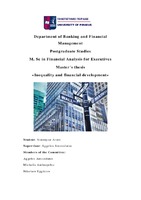Inequality and financial development

Προβολή/
Λέξεις κλειδιά
Inequality ; Financial development ; Labor ; Education level ; Demographic factors ; Industrialization ; Public sectorΠερίληψη
In the particular project is analyzed the inequality and financial development. The objective was to identify the inequality as a term and to analyze it in relation to the position of the term in specific states examined. The study focused on its theoretical part on specific variables on capital, education level, and demographic factors e.t.c. Variables that count the inequality and today affect the economic stability of the countries. Through this study, issues that are currently occupied by the global economy are recognized and addressed to them through study conclusions.
At the research level in the study, the researcher decided to examine two indexes, the Gini index and the labor measured in hours, the constructed model of the research was G = a + b * L + Σdti.
The survey was conducted for the years 1991 to 2015 from the Index Mundi database for countries like USA, Austria, Belgium, France, Germany, Denmark, Switzerland, Greece, Ireland, Iceland, Turkey, Spain, Finland, Canada, Luxembourg, Norway, Netherlands, Portugal, Sweden, Italy, Japan, Australia, New Zealand, Mexico, Czech Republic, Korea, Poland, Hungary and Slovakia.
The final conclusion of the project was that as the total number of labor hour’s increases then the inequalities among the population decline. This seems logical since it is more likely that the increase in total working hours will reduce the unemployment rate and therefore the inequalities among the top 5% of the population and the lower 5% of the population in the income scale and all other factors of the living conditions.


